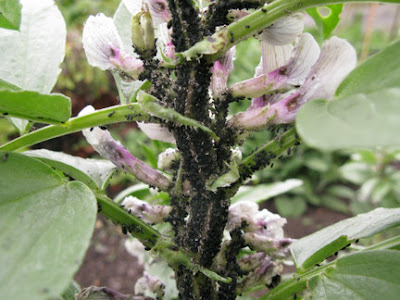Broad beans (aka Fava beans) are an excellent source of protein, dietary fibre, potassium, iron, magnesium, calcium, Vitamin C and Vitamin B6. A minority of people with a specific genetic condition (favism) are allergic to broad beans but, for the vast majority, they can be considered a superfood.
In my experience, growing broad beans is easy but keeping them free of blackfly (aka black bean aphid) is a near impossible task.
 |
| Blackfly on Broad Beans |
Spring-sown beans, for harvesting in June-July, may be more susceptible to blackfly infestations than autumn-sown varieties (harvest in May). However, I wouldn't rely too heavily on this advice - it may simply be that infestations in spring-sown beans occur when there is a lot going on in the kitchen garden. Regular inspection of your broad bean plants is the key to controlling blackfly and this task may get overlooked when there are so many other things needing your attention.
As blackfly infestations start at the growing tips of the plants, pinching the tips out can reduce the main entry points of these pests. Established plants can be sprayed with a jet of water; literally, blasting the little beggars to oblivion. Whilst great fun, this provides only temporary relief and will need to be repeated again and again. Alternatively, a gentler spray with a dilute soap solution or a commercial alternative can help stop the infestation from getting out of control. Biological controls don't really work in my experience but it is always worth encouraging predators such as ladybirds into the garden. We do grow sacrificial plants (e.g. nasturtiums) though not among the broad beans - they do get attacked by blackflies but are they just encouraging these pests into the garden and will they find your broad beans anyway?
I had a small patch of spring-sown broad beans this year which suffered a catastrophic blackfly attack. Those plants are now composting away in one of my Hotbins.
In an earlier post, I described an experiment I'm carrying out this year where leek sowing/planting is delayed in an attempt to avoid the worst ravages of leek moth and allium leaf miner. The results will be known later this year.
Along similar lines, I am trying out a variety of broad beans (Luz De Otono from D.T. Brown) that are sown June-September for a September-November harvest. The first beans were sown directly in the ground on August 5th and emerged a week or so later...
 |
| Emerging Summer-sown Broad Beans (Luz De Otono) |
Some watering was required during the dry spell we are currently experiencing but germination rates were 100%.
On the 16th August, a double row was sown in what was the onion/garlic patch. A single bean was placed in a hole, made with a dibber, covered with sieved homemade compost and watered in...
 |
| Broad Beans sown in cleared Onion Patch |
I plan to sow at least two more double rows in late August and early September. Expect the final report towards the end of this year.






0 comments:
Post a Comment